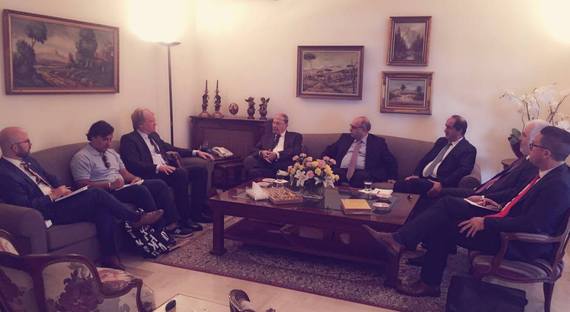Aoun: Lebanese President
Receiving desperate calls for help from the Middle East has been a normal part of my life for years now. Ever since the beginning of the Iraq war in 2003 - when sectarian warfare lay the groundwork for a brutal persecution of Christians and other minorities - my mailbox has been flooded with stories: of children kidnapped and raped, of extortion, of families being forced to leave their homes. Such excruciating stories are what make the genocide of Christians, and other minorities in the Middle East, and are what make it real for those of us lucky enough to be living far away from it.
Ever since the latest harbingers of horror- ISIS- arrived with a mission to completely erase Christians from their ancient and ancestral homelands, my organization "A Demand for Action" has been shining a spotlight on what most media outlets reporting on Iraq and Syria have largely ignored.
In my latest trip to the Middle East I travelled to Lebanon, and was joined by European parliamentarian Lars Adaktusson and members of his staff Charlie Weimers and Martin Källstrand. As part of our joint mission to bring attention to the current dire situation facing Assyrians/Chaldeans/Syriacs, Maronites, and other Christians in countries like Iraq, Syria, and Lebanon, we also met with then Lebanese presidential candidate Michel Aoun.
That was six weeks ago Aoun, now he is elected president of the Republic of Lebanon.
That an 82-year old former army commander and civil war leader was the one to end a political vacuum that lasted for more than two years is itself remarkable. It is even more noteworthy when considering regional politics, in that his election effectively provides a proxy victory for Shi'ite ally Hezbollah.
But what stands out the most is that Aoun is Christian, and he has, at least for the moment, brought warring factions together and managed to unite Lebanon; and this coming at a time when there are hardly any Christians left in the region, with those remaining carrying little hope of a future in the Middle East. Aoun even gained the backing of the former Lebanese prime minister Saad al-Hariri, Saudi Arabia's preferred leader. During the Lebanese civil war, Aoun fought the then occupying Syrian troops and fled to France afterwards. He returned to Lebanon in 2005, only to stun observers by befriending the Syrian leadership and its Shiite ally, Hezbollah.
At our meeting in Lebanon, we were greeted by Aoun at his well-guarded residence in Rabieh, a suburb of Beirut. We were told that the "Lebanese Model" of sharing power in politics is the equal division of power amongst Christians and Muslims in the cabinet and in the parliament. The speaker should always be a Shiite Muslim, the Prime Minister a Sunni Muslim, and the President a Maronite Christian.
As the then main contender for the presidency - and now elected president - Michel Aoun is also the first person that has succeeded in uniting most Christian political parties and communities. He himself is a Maronite, representing most of the Christians in Lebanon, and his main opponent was Samir Geagea, also a popular Maronite leader who in January of this year put aside his candidacy to back Aoun.
The messages coming out of Lebanon concerning the new president are hopeful:
"Lebanon is the last outpost of Christians in this part of the world, here we are still free and are equal in relation to the Muslim population. We represent 2 million of the 4 million who live in the country; if the "Model" is broken, and you don't not give the presidency to Aoun, then Muslims are telling Christians that they have no future left anywhere Middle East" said Habib Afram, President of the NGO Syriac League and Secretary General of all Christian League in Lebanon, at Aoun's residency.
Aoun himself was of the same belief; he told us that those who opposed him did so because they do not want Christians to have any future in the Arab world. He was convinced that this was the last call for Christians in the area, that the election would show that they still are part of the mosaic of Middle East.
"It is our right as Christians to be represented by one of our own. It's not about me, not about the person Michel Aoun, it's about the representation of all Christians. "
EU parliamentarian Lars Adaktusson speaks along similar lines:
"It is important to listen to the Lebanese experience of coexistence between Christians and Muslims, for Lebanon is one of the countries where the two religions have coexisted for a very long time. It is important to support the Christians in Lebanon in their work for equal rights."
When I call Habib Afram fireworks are echoing across Beirut as the tally of votes cast by lawmakers is counted and shows Aoun the winner.
"This is a victory for all Christians in the Middle East. And here in Lebanon it marked the first time since the end of 1975-90 civil war that a Maronite Christian leader with a popular support base was elected to the post reserved for Christians under the sectarian system of government. I am more than happy. As I said when you were visiting is this the last outpost for Christians in this area, this has a symbolic value but it also shows that we still are in the game."

